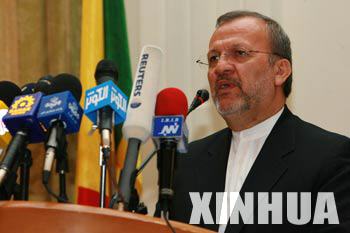
Iranian Foreign Minister Manouchehr Mottaki addresses a
news conference in Tehran, capital of Iran, Aug. 16, 2006. The Iranian foreign
minister said that Iran was ready to discuss suspension of nuclear enrichment
activities with the Europeans. -Xinhua
Iranian Foreign Minister Manouchehr Mottaki yesterday expressed the country's
willingness to discuss suspension of nuclear enrichment activities with the
Europeans.
"Iran is willing to discuss the suspension of our nuclear activities with the
European states," Mottaki told reporters after meeting with his visiting Malian
counterpart Mokhtar Ouan.
"Even it is not logical for them to demand a suspension of our nuclear
activities, we can still discuss it," Mottaki said.
On June 6, EU foreign policy chief Javier Solana presented Iran with a
package agreed on by the United States, Russia, China, France, Britain, and
Germany concerning the Iranian nuclear issue.
The proposal includes both incentives aimed at persuading Iran to suspend
uranium enrichment and possible sanctions if Iran does not comply. Iran has
promised to give an official response by Aug.22.
"Iran have reiterated that it will be ready to negotiate with the Europeans
on all questions and ambiguities (of the six-nation package)," Mottaki said.
The chief Iranian diplomat stressed that the most effective way to solve the
Iran nuclear issue would be holding negotiations that would safeguard Iran's
rights and remove Europe's concerns over Iran's peaceful nuclear program.
But Iran would "never give up its inalienable rights under any
circumstances," Mottaki stressed.
The United States has accused Iran of secretly developing nuclear weapons
under a civilian front, a charge categorically denied by Tehran which says that
its nuclear program is for peaceful purposes.
The UN Security Council on July 31 adopted a resolution urging Tehran to
"suspend all enrichment-related and reprocessing activities, including research
and development" by Aug. 31 or face the prospect of sanctions.
Iran has rejected the resolution, saying it has no legal
basis.



